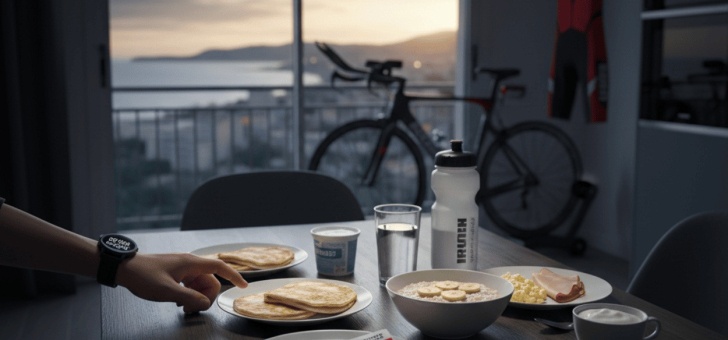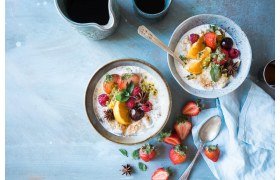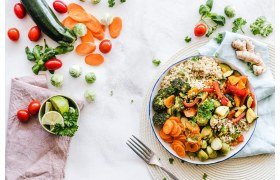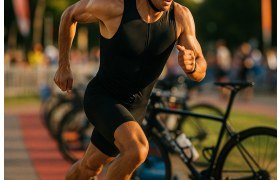Triathlon Day Breakfast: Nutrition to Fuel Your Performance
By Sarah Published on 03/10/2025 at 20h00 Reading time : 3 minutes Image credit: AI generated
Image credit: AI generated
What to Eat for Breakfast on Triathlon Day
As an endurance athlete, you know that proper nutrition is essential for optimal performance. On triathlon day, breakfast plays a pivotal role in setting the stage for a successful race. This article provides a comprehensive guide to what to eat for breakfast, ensuring you fuel up properly and avoid cravings throughout the day. 🚴♂️
Understanding Your Nutritional Needs
Before diving into specific foods, it's important to understand the nutritional needs on race day. Your breakfast should be designed to:
- Provide adequate energy for the race.
- Maintain hydration levels.
- Prevent gastrointestinal distress.
- Manage hunger and cravings effectively.
Carbohydrates: Your Primary Fuel Source
Carbohydrates are the cornerstone of any athlete’s diet, especially on race day. They provide the glycogen stores your body needs to sustain prolonged activity.
Recommended carbohydrate sources include:
- Oatmeal: A classic breakfast choice rich in complex carbs that provides sustained energy.
- Whole grain bread or toast: Perfect for topping with nut butter or honey for added calories.
- Bananas: A quick and easy source of carbohydrates that are also easy on the stomach.
- Pancakes or waffles: Made from whole grains for an energy-packed option.
Proteins: Repair and Recovery
While carbohydrates are essential for energy, incorporating some protein into your breakfast can aid in muscle repair and recovery.
Great protein sources to consider include:
- Greek yogurt: Packed with protein and can be mixed with fruits and honey.
- Eggs: A versatile option that can be boiled, scrambled, or made into an omelet.
- Protein shakes: Easy to digest and can be prepared quickly.
Fats: A Small Component
While fats should not dominate your breakfast, small amounts can help keep you satisfied without weighing you down.
Consider these healthy fats:
- Avocados: Great on toast or in smoothies for a creamy texture.
- Nut butters: Almond or peanut butter can be spread on whole grain toast for a flavorful boost.
Timing Your Breakfast
Knowing what and when to eat is equally important. It’s generally recommended to have your breakfast 2-3 hours before the race. This allows your body enough time to digest the food and convert it into usable energy. 🕒
If you usually race early in the morning, you might have to adjust your routine to ensure adequate nutrition. If you can’t manage a full meal, consider a smaller snack 30-60 minutes before the race, such as:
- Energy bar or gel
- A piece of fruit
Sample Breakfast Menu
To give you an idea of what an ideal triathlon day breakfast might look like, here is a sample menu:
- 1 cup of oatmeal topped with sliced banana and a drizzle of honey.
- 2 scrambled eggs with spinach and tomatoes.
- Whole grain toast with a layer of almond butter.
- 16 oz of water to stay hydrated.
Hydration: Don’t Forget to Drink
Hydration is crucial for endurance performance. Dehydration can significantly impede your energy levels and performance. Aim to drink water or an electrolyte-rich beverage during your breakfast to stay hydrated. According to a study published in the Journal of Sports Sciences, proper hydration can enhance performance by maintaining muscle function. 💧
Avoiding Common Pitfalls
On race day, it’s important to stay clear of certain foods that may lead to gastrointestinal issues or low energy levels:
- High-fiber foods: These can lead to bloating and discomfort.
- Fatty or greasy foods: Avoid anything that is too rich or heavy.
- New foods: Stick to what you know works for your body; avoid trying new recipes or ingredients.
Special Considerations
Every athlete is unique, and you might have specific preferences or dietary restrictions. Whether you are vegan, vegetarian, or have food allergies, there are many alternatives that can provide the necessary nutrients.
For instance, if you are lactose intolerant, consider almond milk yogurt or options with plant-based protein. If gluten is an issue, utilize gluten-free oats or rice cakes as your carb source.
Try Out Different Combinations
Leading up to your event, ensure you test different breakfast combinations in your training sessions. This allows you to see what works best for your body and helps prevent surprises on race day.
Listen to Your Body
Ultimately, the best approach is to listen to your body. You know what your energy needs are and how your digestive system reacts to different foods. Trust your experience and make adjustments as needed. 🏃♀️
🧠 FAQ - What to Eat for Breakfast on Triathlon Day
❓ What should I eat for breakfast on triathlon day?
Eat a balanced meal including carbohydrates, proteins, and healthy fats, such as oatmeal, eggs, and whole grain toast.
❓ How long before the race should I eat breakfast?
Aim to eat your breakfast 2-3 hours before the race start to allow for proper digestion.
❓ Can I eat snacks closer to the race time?
Yes, if needed, you can have a small snack like a banana or energy bar 30-60 minutes before the race.
❓ What foods should I avoid on race day?
Avoid high-fiber, greasy, or unfamiliar foods that could cause digestive issues.
❓ How important is hydration for triathlon day breakfast?
Hydration is crucial; be sure to drink enough water or electrolyte beverages to maintain energy levels.
❓ What if I have dietary restrictions?
Choose alternatives that meet your dietary needs, such as gluten-free grains or plant-based proteins.







